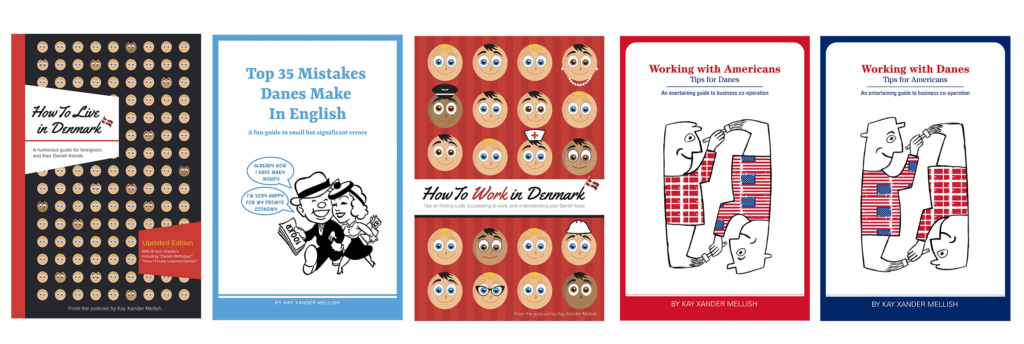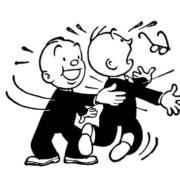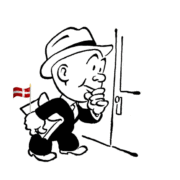Painful hugs and Poison Gifts: When the same words mean different things in Danish and English
When you’re just starting to learn Danish, some people may tell you that Danish and English are very much alike.
In some ways, they are. The Vikings invaded England several times and left behind their language as well as their genes.
The Danish word sky, meaning cloud, became the English word ‘sky.’ Øl – Danish beer – is ‘ale’ in English.
But in some ways, English and Danish are not alike, and that can cause problems. Back in the days when I was learning French, they called them ‘false friends’ – words that look identical but mean entirely different things.
The one I noticed first when I arrived in Denmark was slut. Slut means ‘finished’ in Danish, all done, but the same four letters in English spell ‘slut,’ which is a not very nice name for someone, usually a woman, who is very friendly in a naked sort of way.
When I first arrived, I remember seeing magazines with a name and a face on the cover, and it would say in big letters ‘SLUT!’
I thought, wow, that’s harsh. That’s a nasty thing to call that poor lady. But, of course, in Danish, it was just saying slut. That lady was finished with something – with her relationship, or her TV show, or her handball tournament. Not ‘slut’, but slut!
A vicious hug
Slut! still gets me sometimes, and so does hug. A ‘hug’, in English, is a nice thing you get from your sweetheart or your grandma. But in Danish, a hug is a karate chop. If you get a hug from someone, it hurts. It’s also used as a metaphor – in Danish newspapers, Danish politicians are often getting a hug from their political opponents. Nobody wants that kind of hug.
Another one that drives me crazy is student. In English, a ‘student’ is anybody who goes to school, anybody who is learning something. You could be a five-year-old student or an 85-year-old student.
That’s not true in Danish. A student is someone who has finished studying, or has at least just finished the big student exam that 18-year-olds take before going on to higher education; in the spring, you’ll see them around town with their traditional white student hats on, and people will say of a young man, “He’s just become a student!” That means he’s just passed that test. You’re not a student until you pass the test.
A poisonous gift
This goes on and on. The English word ‘gift’, like a birthday present, is gift in Danish. Poison.
So, if you see a package with the word gift and a skull and crossbones, it doesn’t mean there’s been a birthday party for a pirate.
Gift – poison – will kill you.
Coincidentally, gift is also the Danish word for getting married.
[icon name=”facebook-square” class=”fa-3x”] [icon name=”twitter-square” class=”fa-3x”][icon name=”instagram” class=”fa-3x”]
.
Buy Kay’s books about Denmark on Amazon, Saxo, Google Books, Apple Books, Barnes & Noble Nook, or via our webshop.
Image mashup copyright Kay Xander Mellish [current_year]
Read also:
Danes and English, or “Can I get by in Denmark without learning Danish?”
Is learning to speak Danish worth it?
How I finally learned Danish: At first, I could only understand the puppets








Aha … – very interesting to learn that an English student is a pupil, of any age/grade.
Hug in Danish is pronounced ”håk” (plus it also means to steal = at hugge: ”la’ mig håk et kys fra din fristende mund”), and it’s funny that the Danish sky (himmel) is cloud in English. Btw, sky is also a delicious thingy we put on leverpostej and Dyrlægens Natmad (I like it very much and thus eat it with a spoon directly from the emballage).
https://www.flickr.com/photos/26855443@N00/820175952
A few years back I got aware of the slut difference, but it wasn’t just until recently I found out that the English slot doesn’t mean a castle, but instead a sort of programme schedule in TV terms – still not sure if that is correct though, can you enlighten and perhaps provide a more precise word? På forhånd tak.
Hi Ulla! I would say a ‘slot’ in English is a long, thin hole into which something is inserted: the classic example is the ‘slot machine’, in which people insert coins through a slot in order to gamble. I’d guess the TV networks took co-opted the term because in their scheduling charts (I used to work in TV) the program periods are long and thin.